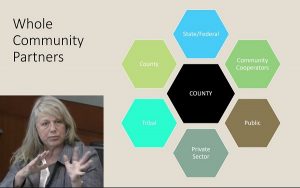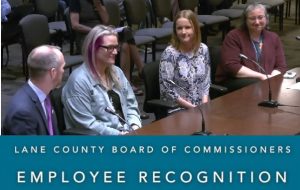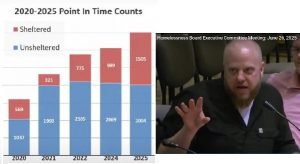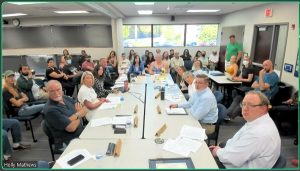River Road – Santa Clara neighborhood plan moves towards adoption
6 min read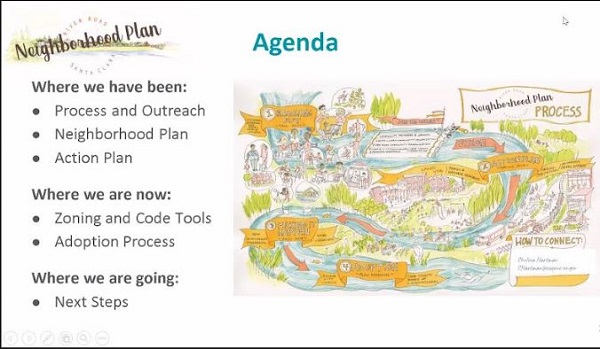
Five years in the making, the River Road / Santa Clara neighborhood plan moves towards adoption. At a July 13 meeting with the city planners, Kate Perle.
[00:00:09] Kate Perle: For anybody who’s been involved with the neighborhood plan, this graphic will look familiar. It was what we started out with in the beginning of 2017. It depicts us as being on a voyage on a river.
[00:00:22] We started with reaching out and we went to visioning, our action planning, to making it happen, and towards the end here, we’re at adoption and that’s where we are now.
[00:00:33] So we’re looking at our adoption process and we’re still refining our zoning and code tools, and the next step for all of us is to take the plan as it is out to our neighbors and gather some feedback from them: Does this reflect what they told us at the beginning of this process, and is this our best option going forward?
[00:00:54] Because the next steps for the community organizations are to have a voting process where we vote to either endorse and move this plan along or something else, which I choose not to think about.
[00:01:07] John Q: While this is their fifth year on the neighborhood plan, outreach has been underway for 20 years.
[00:01:14] Kate Perle: So the outreach we’ve done actually started I’d say somehow 20 years ago. River Road and Santa Clara have a lot of similarities in the structural way we’re designed, where: we have half our residents are unincorporated; we have special districts that complicate our service delivery; and together we represent approximately a fifth of the city’s land mass, and we’re 32,000 residents strong, our two neighborhoods.
[00:01:43] And this plan that we’re working on now really rests on the shoulders of two decades of community work by residents.
[00:01:49] John Q: After recapping the process to date, Kate Perle.
[00:01:53] Kate Perle: So the most important part for all of us moving forward is, how do we get the news out to our neighbors? How do we make sure enough people hear about it, read about it, understand what it is, and we need people to show up.
[00:02:07] John Q: Later in that June 13 meeting, River Road’s Jon Belcher.
[00:02:11] Jon Belcher (River Road): We put a lot of work into this and we are looking towards the end, but there are several points that we need your feedback on, where we have not quite reached agreement on how to move forward. So when you do give your feedback, look for those, because those are the ones that we really need to hear from everybody.
[00:02:31] Chelsea Hartman (City Planning): A big chunk of the outreach ahead of us is honing in on kind of what Jon’s talking about is: What are the remaining concerns and issues we want feedback on? So it helps us land in a certain place on some of those things, primarily in the code.
[00:02:47] Douglas Moorhead: You’re trying to get everybody’s support. and this is like a train. I just have some real concerns about how fast this is going. You may think it’s not going very fast, but right now it’s your effort to try and get the community to understand what you’ve come up with. And you’re giving us two months to come up with support. I think that’s not very fair.
[00:03:08] From my experience living here in Oregon, I’ve seen some huge amounts of money spent by government agencies going down rat holes that had to be withdrawn— like downtown Eugene when they shut down all the streets; the school system where they spent a billion dollars on this new way of learning and 10 years later, they decided it doesn’t work anymore.
[00:03:28] Trying to get support from the people, to me, is indicative of why we have gone down some of these rabbit trails and found out that they don’t necessarily work and they’re going to cost a tremendous amount of money.
[00:03:43] Mysti Frost (River Road): I heard today about a 19-year-old young man run over by a truck a day ago. And it keeps happening and we have a plan here to hopefully make our streets safer for pedestrians and bicyclists.
[00:04:03] When I speak to folks about this kind of infrastructure that we’re talking about, the changes might be hard in the beginning to adapt to, but we’re humans, we’re adaptable, right? And change is a little bit uncomfortable, but I just strongly feel that if we keep equity as the foundation of all of the work that we do, then we take into account our youth and our BIPOC communities and our lower-income communities, we’re going to find our answers to these questions and concerns pretty straightforward.
[00:04:37] John Q: Five days later, on July 18, the River Road board reviewed that meeting.
[00:04:44] Jon Belcher (River Road): Board members were invited to an overview of the neighborhood plan and the outreach process, and to help get the word out to the neighbors.
[00:04:53] Clare Strawn (River Road): It didn’t get down to the issues that needed to be resolved at all until Jon brought it up at the very end. And so I found it kind of boring and frustrating.
[00:05:04] Stefan Ostrach (River Road): I think you mentioned during that meeting, that there were issues that you felt were unresolved in the neighborhood plan. So I’m not very enthusiastic about helping to publicize something when there’s things that aren’t resolved.
[00:05:20] Jon Belcher (River Road): You raise a very important point. It’s frustrating to me that we’re trying to get feedback for a plan that’s not jelled. To my mind, there’s several unresolved issues. And if we’re going to do outreach, it’s important that we do outreach that gets feedback on those issues in particular.
[00:05:39] John Q: Jon said their July newsletter listed five key issues. During the board meeting, he highlighted the Greenway and parking.
[00:05:47] Jon Belcher: We have action items and plans to preserve the Greenway through a special area zone as part of the plan, but frankly, the plan doesn’t really have a special area zone for that purpose. And we have not made progress on how to deal with that with staff.
[00:06:06] I don’t want a neighborhood plan that creates parking problems near every major development that occurs. We proposed a simple solution to resolve it. They haven’t heard it. Ecco Apartments is a nightmare for everyone who lives around it. Sorry, (Planning Commissioner) Dan (Isaacson), but the people who are parking in the neighborhood are creating havoc.
[00:06:26] But we will find a way. We can’t plan forever. I mean, part of the problem is that other things are happening at the same time, like MovingAhead and land use code that’s being developed around the Willamette Greenway, et cetera, all of House Bill 2001 and middle housing, all those things are going on around us at the same time. The longer we take, the more likely there are to be more of those. So we’ve got to move forward but we’ve got to do it in a sensible way.
[00:06:50] John Q: City planners shifted to Northwest Eugene after their South Willamette plan was rejected by residents. Five years later, with River Road expressing frustration, City planners may be racing towards another disappointing result.
[00:07:03] Neighborhood leaders will be conducting outreach throughout the summer. To get involved, see the River Road or Santa Clara websites.
